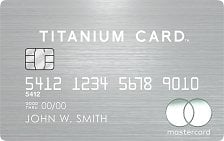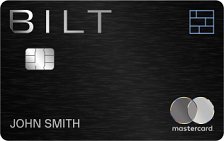Filter Options
×-
-
Unselect all
-
Unselect all
-
Unselect all

Showing 602 Cards
Sort By Column Name:
Wells Fargo Autograph Journey Visa® Credit Card

Wells Fargo Autograph Journey Visa® Credit Card
- 21.24%, 26.24%, or 29.99% variable based on creditworthiness and the Prime Rate Regular Purchase APR
- 21.24%, 26.24%, or 29.99% variable based on creditworthiness and the Prime Rate Balance Transfer APR
- 29.99% variable based on the Prime Rate Cash Advance APR
At a Glance
The Wells Fargo Autograph Journey Card provide a lucrative earning platform for travelers who want the freedom to book travel on their terms and not based on a bank's travel portal. The card earns up to 5X points on travel purchases, offers points transfers to leading carriers and hotels, and comes with a slate of tarvel credits and benefits for a modest $95 annual fee.
- Best Benefits
- Rates & Fees
- Why Should You Apply?
- $50 annual airline statement credit
- No foreign transaction fees
- Earn 5X points on hotels, 4X on airlines, and 3X on travel and dining purchases
- Earn 1X points on all other purchases
- Transfer points to leading loyalty programs
- Regular Purchase APR: 21.24%, 26.24%, or 29.99% variable based on creditworthiness and the Prime Rate
- Balance Transfer APR: 21.24%, 26.24%, or 29.99% variable based on creditworthiness and the Prime Rate
- Balance Transfer Transaction Fee: Introductory fee of either $5 or 3% of the amount of each balance transfer, whichever is greater, for 120 days from account opening. After that, up to 5% for each balance transfer, with a minimum of $5
- Cash Advance APR: 29.99% variable based on the Prime Rate
- Cash Advance Transaction Fee: Either $10 or 5% of the amount of each advance, whichever is greater
- Annual Fee: $95
- Late Payment Penalty Fee: Up to $40
- You already bank with Wells Fargo
- You want a lucrative travel credit card without needing to book in restrictive travel portals
- You don’t want to pay any foreign transaction fees
- You can make use of the $50 annual credit
U.S. Bank Business Altitude™ Power World Elite Mastercard®

U.S. Bank Business Altitude™ Power World Elite Mastercard®
- 20.24% to 28.24% variable based on creditworthiness and the Prime Rate Regular Purchase APR
- 20.24% to 28.24% variable based on creditworthiness and the Prime Rate Balance Transfer APR
- 29.99% variable based on the Prime Rate Cash Advance APR
At a Glance
The U.S. Bank Business Altitude™ Power World Elite Mastercard® is a business rewards card for that earns up to 2.5X points on eligible purchases with mobile wallets, with no foreign transaction fees and a $0 introductory annual fee.
- Best Benefits
- Rates & Fees
- Why Should You Apply?
- Earn 6X points on on hotels and car rentals booked in the U.S. Bank Rewards Center
- 2.5X points on up to $5,000 in mobile wallet purchases each quarter
- 2X points on all other purchases
- No foreign transaction fees
- Regular Purchase APR: 20.24% to 28.24% variable based on creditworthiness and the Prime Rate
- Balance Transfer APR: 20.24% to 28.24% variable based on creditworthiness and the Prime Rate
- Balance Transfer Transaction Fee: Either 3% of the amount of each transfer or $5 minimum, whichever is greater
- Cash Advance APR: 29.99% variable based on the Prime Rate
- Cash Advance Transaction Fee: Either 5% of the amount of each advance or $10 minimum, whichever is greater
- Penalty APR: 32.49%
- Annual Fee: $195
- Late Payment Penalty Fee: $40
- Return Payment Penalty Fee: $40
- Over Limit Penalty Fee: $40
- Your company spends heavily on mobile wallet purchases
- You plan to issue multiple employee cards to maximize rewards
- You want to streamline your bonus categories
- You spend enough on to justify the annual fee
Universal Rewards Visa Signature®

Universal Rewards Visa Signature®
- 21.99% to 28.99% variable based on creditworthiness and the Prime Rate Regular Purchase APR
- 21.99% to 28.99% variable based on creditworthiness and the Prime Rate Balance Transfer APR
- 28.99% variable based on the Prime Rate Cash Advance APR
- 0% for 6 months from account opening date Intro Purchase APR
At a Glance
The Universal Rewards Visa Signature® Card is a no frill rewards card that earns 2% back on eligible Universal purchases, 1% back on all other purchases, and more - for a $0 annual fee.
- Best Benefits
- Rates & Fees
- Why Should You Apply?
- Earn 2% back in rewards on qualifying Universal purchases
- 1% back on all other purchases
- 10% ff select merchandise, food and beverage purchases
- No annual fee
- Intro Purchase APR: 0% for 6 months from account opening date
- Regular Purchase APR: 21.99% to 28.99% variable based on creditworthiness and the Prime Rate
- Balance Transfer APR: 21.99% to 28.99% variable based on creditworthiness and the Prime Rate
- Balance Transfer Transaction Fee: Either $10 or 5% of the amount of each transfer, whichever is greater
- Cash Advance APR: 28.99% variable based on the Prime Rate
- Cash Advance Transaction Fee: Either $15 or 5% of the amount of each cash advance, whichever is greater
- Foreign Transaction Fee: 3% of the transaction amount in U.S. dollars
- Late Payment Penalty Fee: Up to $40
- Return Payment Penalty Fee: Up to $35
- You love theme parks but prefer Universal Studios
- You don't want to pay an annual fee
- You want basic cash back rewards on everyday purchases
Universal Rewards Plus Visa Signature®

Universal Rewards Plus Visa Signature®
- 21.99% to 28.99% variable based on creditworthiness and the Prime Rate Regular Purchase APR
- 21.99% to 28.99% variable based on creditworthiness and the Prime Rate Balance Transfer APR
- 28.99% variable based on the Prime Rate Cash Advance APR
- 0% for 6 months from account opening date Intro Purchase APR
At a Glance
The Universal Rewards Plus Visa Signature® Card offers up to 4% cash back on Universal purchases, plus provides 10% savings on eligible purchases within the park. Cardholders also enjoy special 0% APR financing for 6 months and more for a $99 annual fee.
- Best Benefits
- Rates & Fees
- Why Should You Apply?
- Earn 4% back in rewards on qualifying Universal purchases
- 2% back in rewards on Travel, Gas and Dining purchases
- Earn one single day theme park general admission ticket each account anniversary
- $99 annual fee
- Intro Purchase APR: 0% for 6 months from account opening date
- Regular Purchase APR: 21.99% to 28.99% variable based on creditworthiness and the Prime Rate
- Balance Transfer APR: 21.99% to 28.99% variable based on creditworthiness and the Prime Rate
- Balance Transfer Transaction Fee: Either $10 or 5% of the amount of each transfer, whichever is greater
- Cash Advance APR: 28.99% variable based on the Prime Rate
- Cash Advance Transaction Fee: Either $15 or 5% of the amount of each cash advance, whichever is greater
- Annual Fee: $99
- Foreign Transaction Fee: 3% of the transaction amount in U.S. dollars
- Late Payment Penalty Fee: Up to $40
- Return Payment Penalty Fee: Up to $35
- You love theme parks but prefer Universal Studios
- You plan to keep the card year-after-year to take advantage of the single-entry reward
- You want basic cash back rewards on everyday purchases
TAP Miles&Go American Express®

TAP Miles&Go American Express®
- 21.24% to 28.24% variable based on creditworthiness and the Prime Rate Regular Purchase APR
At a Glance
The TAP Miles&Go American Express® credit card is the ideal travel companion for anyone who want premium travel perks but hate paying a steep annual fee of hundreds of dollars. The card, from Cardless, charges $79 per year but grants perks like lounge access, preferred boarding, and more.
- Best Benefits
- Rates & Fees
- Why Should You Apply?
- No foreign transaction fees
- Earn 60,000 miles after spending $2,500 in purchases in the first three months
- Earn 3X miles on TAP Air Portugal purchases
- Earn 2X miles on dining, plus rideshares, taxis, and public transit
- Earn 1X miles on all other purchases
- Two complimentary TAP lounge passes each year
- Preferred boarding on TAP-operated flights
- Regular Purchase APR: 21.24% to 28.24% variable based on creditworthiness and the Prime Rate
- Annual Fee: $79
- Late Payment Penalty Fee: Up to $30
- Return Payment Penalty Fee: Up to $30
- You travel to Portugal, Europe, or other similar destinations often
- You prefer to fly with TAP Air Portugal or other Star Alliance airlines
- You want access to premium perks like airport lounges and upgrades
- You plan to spend at least $2,500 in the first three months
You've viewed 5 of 602 credit cards
What Is a Good Credit Score?
A “good” credit score varies depending on your scoring model. Both FICO and VantageScore – the two most popular scoring models – have slightly different calculations for what is a good score and what they consider excellent or fair.
What’s Considered a Good FICO Score?
The FICO scoring model is the oldest and most popular credit scoring model among banks. Estimates state that approximately 90% of banks, lenders, and financial institutions rely on FICO Scores to judge applicants’ creditworthiness. The FICO scoring range is from 350 to 850, with a score of between 730 and 799 considered “good” to “very good.”
What’s a Good VantageScore?
Like FICO, VantageScore measures potential applicants’ creditworthiness and reliability. While less popular than FICO, VantageScore is the creation of the three major credit bureaus: Equifax, Experian, and TransUnion. The VantageScore model ranges from 300 to 850, with a score of 681 to 780 considered “good.”
What Factors Determine What a “Good” Credit Score Is?
Both FICO and VantageScore differ in terms of how much weight they place on certain credit factors. FICO places greater importance on the total amount of debt a person has and less on their average age of credit. Conversely, VantageScore puts more weight on the average age of credit than FICO and slightly less on the total amount of debt owed.
Despite these discrepancies, there are a few factors that everyone should pay attention to to maintain or build their credit score. These factors include:
- Payment history: How many of your payments are made on time, and how many payments do you miss?
- Total debt: How much do you owe on your credit accounts?
- Credit utilization: How much of your available credit are you using?
Individuals with a good credit score rarely miss payments. After all, how can a lender deem your credit as good and your lending risks as minimal if you regularly fail to pay back your debts? Additionally, lenders might view you as a risky applicant if you rely too much on your credit accounts. Over-reliance on credit might appear to a bank as someone being financially stretched.
What are the Benefits of Having Good Credit?
Having a good credit score increases your chances of successfully applying for almost any credit card offer on the market. Lenders prefer applicants with good credit scores because it indicates that they are less risky than other applicants and can be relied upon to make their monthly payments.
Here are some of the benefits of having a good credit score:
| ① Better approval odds | Good credit doesn’t guarantee your credit card application will be approved, but it certainly helps. With a good credit score you’ll have access to most credit card offers, including exclusive credit cards and cards with no annual fees. |
| ② Better interest rates | Better credit scores typically enjoy access to lower APR on credit cards, mortgages, and other types of loans. According to the CPFB, “credit card companies typically offer their best rates to customers who have the highest credit scores.” And if the APR on your credit card isn’t to your liking, having good credit will make it easier for you to negotiate a lower rate with your card issuer. |
| ③ No deposits required | One of the best rewards for maintaining good credit is that you likely don’t have to worry about security deposits on accounts. A good credit score means you won’t have to provide collateral or upfront payments to open utilities accounts – or get a new phone line. |
| ④ Better auto insurance rates | Having Prime credit means you enjoy lower rates for almost everything credit-related, including your car loans. Insurance companies rely on credit scores to gauge an applicant’s risk level. These firms often punish poor credit with higher insurance premiums. |
| ⑤ Peace of mind | Having a good credit score means that you are on the right track financially. With good credit, you are paying your bills on time, keeping your credit use low, and maintaining the correct processes that are critical to financial success. |
Good credit can provide numerous advantages and improve your financial well-being. Maintaining a good credit score by making timely payments and managing your debts responsibly is important.
How to Improve Your Credit Score
Here’s a few practical tips to help you on your credit-building journey:
- Check your credit report: Obtain a copy of your credit report from all three major credit bureaus (Equifax, Experian, and TransUnion) and review them for any errors or inaccuracies.
- Pay on time: Pay your bills on time, as payment history is a significant factor in determining your credit score.
- Reduce your credit usage: Aim to keep your credit card balances low in relation to your credit limits. Ideally, keep your credit utilization below 30%.
- Build a long credit history: The length of your credit history is important, so it’s beneficial to keep older accounts open and in good standing.
- Get a diverse credit mix: Having a mix of credit types, such as credit cards, auto loans, and mortgages, can positively impact your credit score.
- Limit new applications: Opening multiple new credit accounts within a short period can lower your average account age and could be perceived as a higher risk.
- Get a secured credit card: If you have trouble qualifying for a traditional credit card, a secured credit card can be a good way to build or rebuild credit.
How Long Does It Take to Build Good Credit?
The time it takes to improve your credit score can vary depending on your starting point and the specific actions you take. Typically, you may start to see some improvement within a few months, but significant changes can take a year or more.
Regularly monitoring your credit score and credit report is important. Many financial institutions and credit card companies now provide free access to your credit score, and you are entitled to a free copy of your credit report from each bureau annually.
By following these steps and monitoring your progress, you can work towards achieving and maintaining a good credit score.
Tips for Maintaining Your Prime Credit Score
Once you have achieved a good or excellent credit score, it is essential to maintain it. Here are some tips to help you maintain your creditworthiness:
- Continue paying bills on time: Consistently paying your bills on time is crucial in maintaining an excellent credit score. Set up reminders or automatic payments to ensure you never miss a payment.
- Avoid unnecessary debt: While taking on additional debt, such as unnecessary loans or credit cards, may be tempting, it is important to be mindful of your borrowing habits. Only take on debt that you can comfortably manage and repay.
- Monitor your credit: Monitor your credit score and credit report closely to identify any changes or errors promptly. This will allow you to take appropriate action if needed.
Conclusion
Achieving and maintaining good credit scores requires discipline, responsible financial habits, and patience. You can enjoy the benefits of prime credit by understanding the factors that influence your credit score, regularly checking your credit report, and taking steps to improve and maintain a good credit score. Remember, good credit opens doors to better financial opportunities and helps you achieve your personal and financial goals.
Check out more
Good Credit Cards
Editorial Disclosure – The opinions expressed on BestCards.com's reviews, articles, and all other content on or relating to the website are solely those of the content’s author(s). These opinions do not reflect those of any card issuer or financial institution, and editorial content on our site has not been reviewed or approved by these entities unless noted otherwise. Further, BestCards.com lists credit card offers that are frequently updated with information believed to be accurate to the best of our team's knowledge. However, please review the information provided directly by the credit card issuer or related financial institution for full details.



